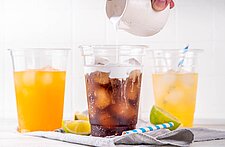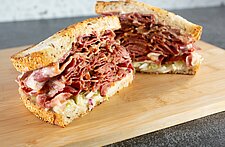Being a vegetarian or vegan is no longer something unusual nor difficult to be in 2018 with meatless restaurants and alternatives reigning supreme. Now, with over 2.5 million Americans adopting the flexitarian diet – in which they stick to a predominantly vegan or vegetarian diet, though meat is still on the plate, just taking on the role of the side dish – and growing, the effects of even more people now looking to find healthier alternatives to animal products in their food is really showing in the supermarket.
Related: The Rise of the Flexitarian
Shopping habits have adjusted with the trend, with center-of-the-store products taking a hit (with 20% of shoppers visiting) and products around the perimeter flourishing (with 40% of shoppers visiting) – meaning fresh ingredients like fruits and vegetables such as Brussel sprouts and bell peppers are having their day in the sun. Sales are strong with +17% for the next four years of food that is less processed, locally grown, fresh and healthful, plus meat, poultry, seafood, fresh produce, milk, dairy, eggs, bakery items and deli/prepared food.
When searching for packaged and microwavable foods, consumers are looking to save on calories, opting to buy calorie-controlled meals that advertise their low caloric content, but also find the balance and chose ones that are more nutritious, allow them to increase their vegetable consumption, are high in vitamins and minerals, and cut down on the high sodium often found in frozen meals. Even in microwavable popcorn, consumers are looking for a healthy blend of oils and ones that forgo GMO corn, artificial flavors and preservatives to reduce the risk of heart disease among other conditions. People are looking more closely at labels than ever before, with 56% of people saying they’re reading to seek out nutritious ingredients like servings of fruits to keep them healthy, 47% saying they’re looking to make sure the products are free of preservatives or artificial ingredients, 45% saying they’re looking for natural ingredients high in vitamins and minerals, and to increase their vegetable consumption.
CLICK HERE to subscribe to the in-sight newsletter
Poor potato chips; they had their time in the spotlight. Fruits and vegetables have become the number 1 snack between meals for Boomers with Millennials close behind at number 3. And while some may be just biting into an apple whole, having servings of fruits, or eating baby carrots out of the bag, there are new, delicious ways to snack on these that reduce the risk of heart disease. Chips are being made of just about anything and are much healthier than their greasy predecessor. Popular sources include seaweed, Brussels sprouts, beets, bell peppers, and beans that also pack a lot of protein and richer flavor than standard potato. Even fruit chips like apple or coconut are replacing some sweeter snacks thanks to the high concentration of sugars that especially pop when dehydrated and devoured (sorry, chocolate chip cookies).
Finally, even the packaging tends to shift to appeal to the Millennial age group this trend is attracting. Bright colors, geometric patterns, “high-fashion” fruit prints and designer fonts all catch the eye of this aesthetically charged group who value design and appearance just as highly as they do the flavors inside the bag.
Related: Culinary Chronicles: Vegetables Step Up to the Plate






